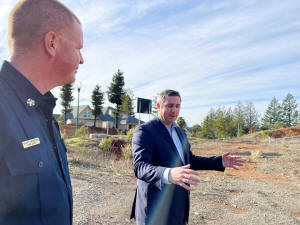As climate change makes wildfires worse, FEMA faced with calls to change
 Send a link to a friend
Send a link to a friend
 [December 19, 2022]
By Sharon Bernstein [December 19, 2022]
By Sharon Bernstein
SANTA ROSA, Calif. (Reuters) - Five years after wildfire ravaged the
California wine country city of Santa Rosa, only mud and a concrete pad
remain atop a hill where a fire station once sat.
Fire Chief Scott Westrope, who lost his own home in the fire, said a
priority was rebuilding Fire Station 5, which burned to the ground in
the inferno that wiped out more than 5,600 structures and killed 22
people.
Building at the bottom of a hill would keep the station from
experiencing the worst fires, which tend to run uphill. But Mayor Chris
Rogers says the Federal Emergency Management Agency (FEMA) denied
funding in part due to rules designed to protect infrastructure harmed
in storms from flood damage, saying the proposed new location was in a
flood zone.
As climate change reshapes the U.S. West, bringing warmer, drier weather
that makes wildfires hotter, larger and more deadly, those in the path
of potential fires say the fate of Fire Station 5 shows FEMA needs to
develop more sophisticated processes for responding to them.
Devastating fires in Santa Rosa and communities elsewhere in California
led survivors to press for changes in the way the agency handles
wildfires. This month, federal lawmakers approved a bill updating an
emergency response system critics say has been more suited to natural
disasters other than fire.
"FEMA's expertise over the years has gotten good at anticipating and
responding to hurricanes, floods and tornadoes," said U.S. Sen. Alex
Padilla, a California Democrat. "Wildfire, not so much."

In a rare instance of bipartisanship, the bill sponsored by Padilla
passed unanimously in both houses of Congress, with a final Senate vote
earlier this month. President Joe Biden is expected to sign it.
The aim is to make sure the agency has processes to recognize the needs
of communities across the country, in Republican and Democratic areas,
impacted by wildfire. FEMA does not even always identify wildland fires
as major disasters, Padilla said.
FEMA would not comment for this story, instead pointing to a statement
in June by its Administrator Deanne Criswell acknowledging that climate
change has fueled ever-larger and more frequent fires, and saying "we
simply cannot shy away from the work required to mitigate future risk."
Padilla's office said the agency provided technical assistance in the
development of his bill.
FEMA has been on the ground, providing temporary housing and counseling
to survivors of wildfire in recent years, gaining expertise with
experience as fires become more frequent.
In Paradise, California, where 19,000 structures were destroyed and 85
people killed in a 2018 wildfire, FEMA worked with residents to improve
the agency's understanding of fire-specific needs such as the removal of
hazardous trees, said the city’s Recovery and Economic Development
Director Colette Curtis.
But FEMA procedures were generally not developed with the rugged terrain
of fire country in mind, she said.

[to top of second column]
|

Fire Chief Scott Westrope and Mayor
Chris Rogers survey the empty lot where the previous office of Santa
Rosa Fire Station 5 was burned to the ground in a wildfire five
years ago, in Santa Rosa, California U.S., December 2, 2022.
REUTERS/ Sharon Bernstein

For example, the agency typically helps to set up a shelter, but
given the vast distances and difficult roads in mountain areas, not
to mention the fact that fire zones can be dangerous to enter for
days or weeks, it was difficult for FEMA to find a site after
Paradise, and hard for local people to reach it.
"There was a sense at FEMA that their systems could be used for all
disasters, but that's not necessarily the case," Curtis said.
The Padilla bill would allow the agency to reimburse state and local
agencies who put firefighting resources in place in advance of a
fire earlier than they do now.
It would also require FEMA to develop a plan for recognizing that
melted roads and infrastructure can be part of wildfire damage, and
direct the agency to develop a protocol for responding to wildfire
in disadvantaged communities.
Poor communities are particularly at risk of being denied funding
for wildfire repairs, in part because the low value of homes makes
it harder to meet minimum levels for financial damages set by a
complicated formula. Such levels are easier to reach in cases of
damage from widespread flooding or hurricanes, said Bryan Schenone,
Emergency Operations Director in Siskiyou County, near the Oregon
border.
In September, a wildfire burned all but a few houses to the ground
in Lincoln Heights, a mostly poor, historically African-American
community in the city of Weed in Siskiyou County. Requests for
federal funding to help rebuild and pay other expenses for those
displaced have stalled.
"We lost two towns this year in the McKinney Fire, and then we lost
Lincoln Heights in Weed," Schenone said. "And both of those combined
did not meet the threshold to consider it a disaster at the scale
that would be required."
California expects to be turned down for its request for a major
disaster declaration for Lincoln Heights and other communities
damaged by wildfire last summer, said Brian Ferguson, spokesperson
for the state Department of Emergency Operations.
In Santa Rosa, a midsized city about 55 miles north of San
Francisco, the Tubbs Fire in 2017 raced through established suburban
areas, jumping six lanes of highway, destroying homes.
It melted roads and left partially burned trees that posed a hazard
if they fell – damage that FEMA was not set up to help repair, Mayor
Rogers said.

The city has identified and purchased a new station site. But
without help from FEMA, it has taken a while to put together
rebuilding resources, Rogers said. The city hopes to break ground in
the coming year.
(Reporting by Sharon Bernstein; Editing by Donna Bryson and Alistair
Bell)
[© 2022 Thomson Reuters. All rights
reserved.]
This material may not be published,
broadcast, rewritten or redistributed.
Thompson Reuters is solely responsible for this content. |